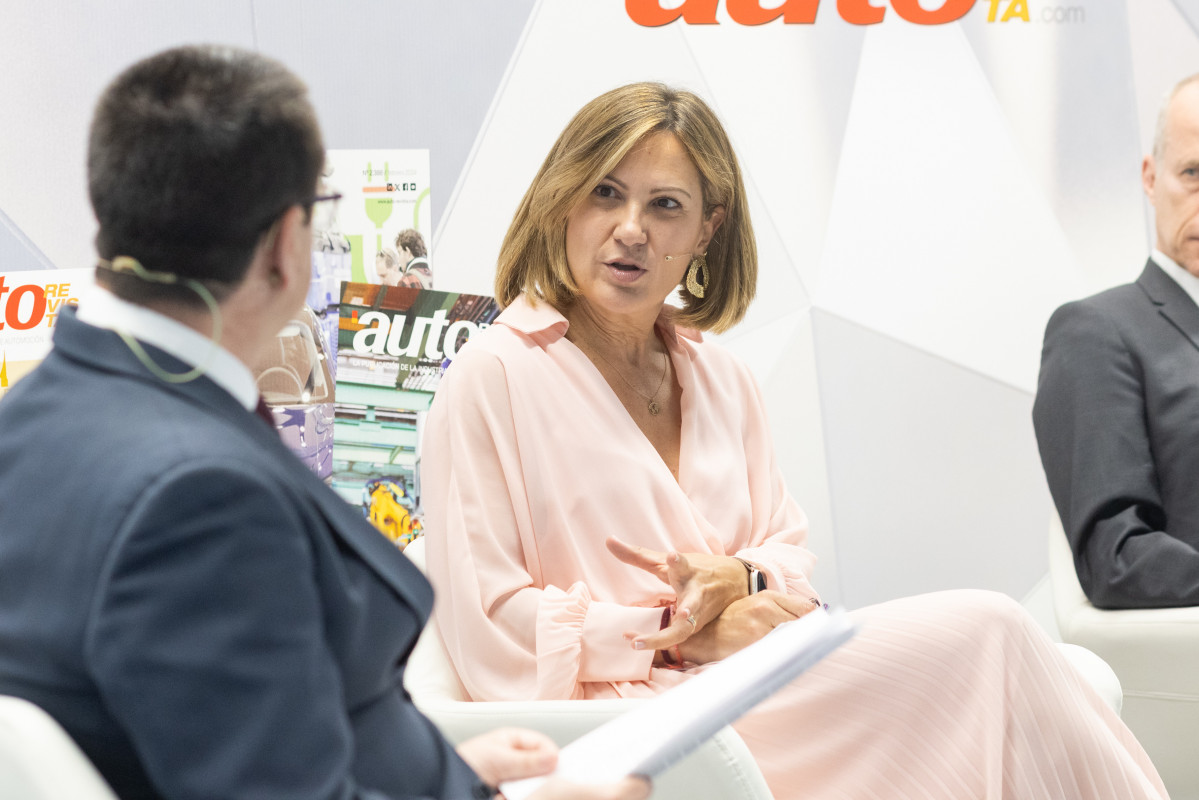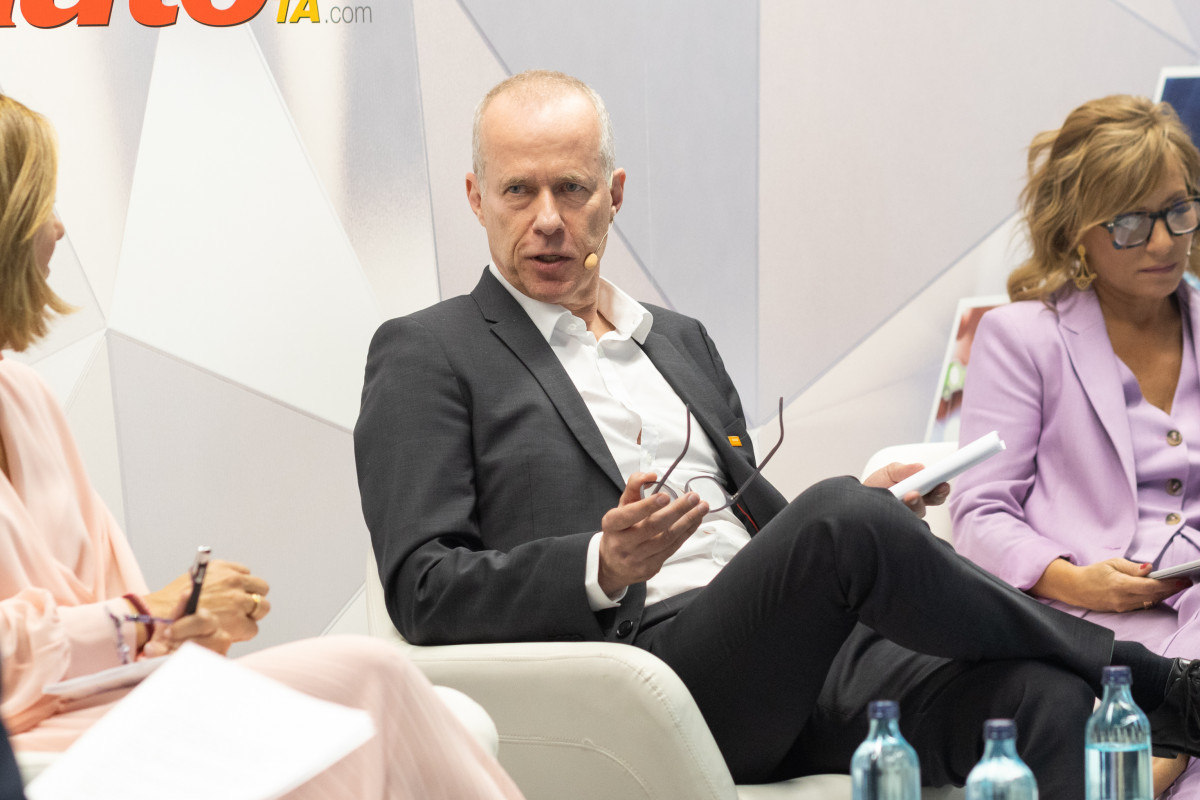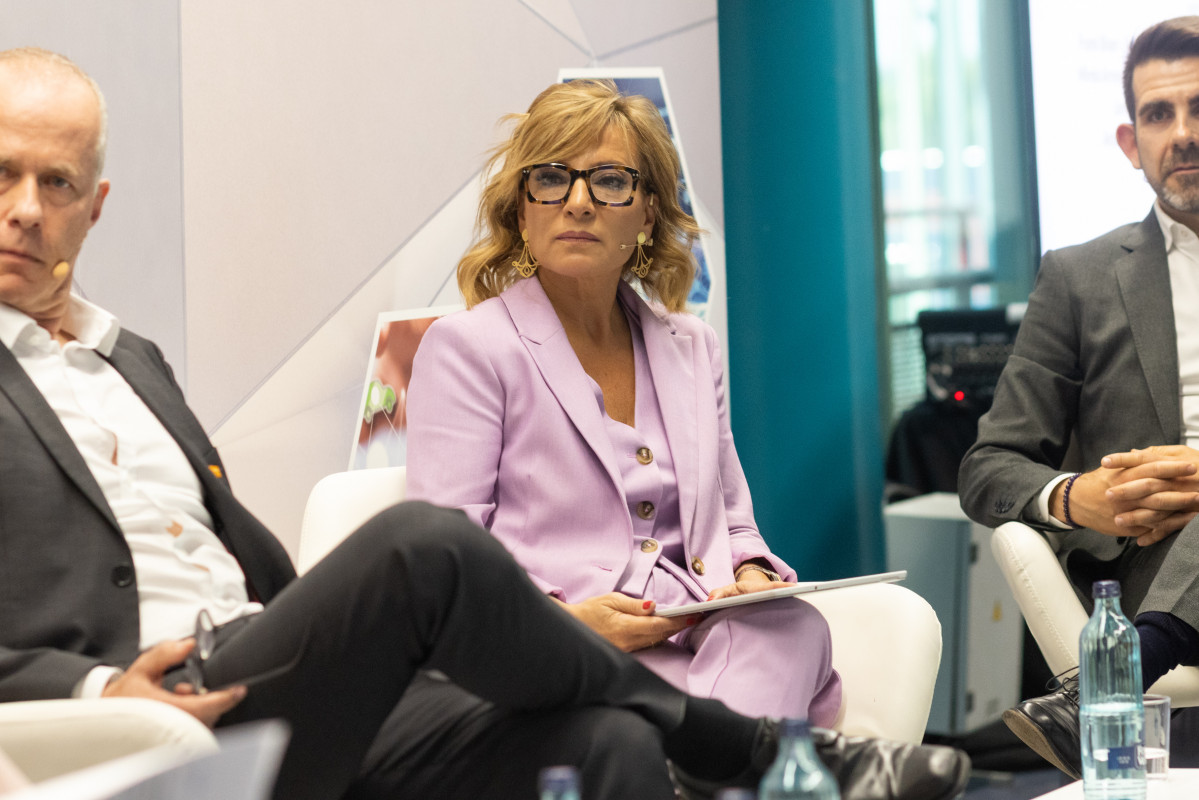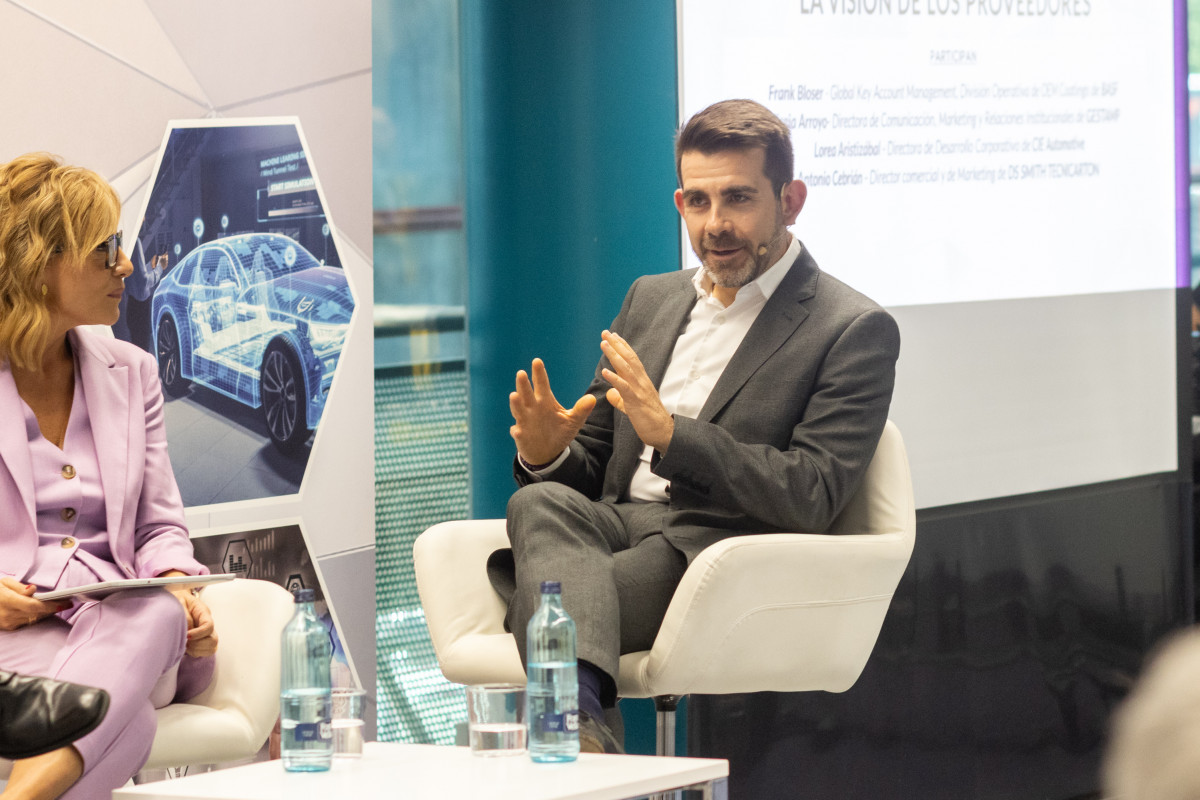The vision of suppliers

The second panel discussion of AutoRevista's 65th anniversary event highlighted the essential contribution of suppliers. Two Spanish multinationals, the largest chemical supplier to the automotive industry and a leading logistics supplier in the field of intelligent packaging were represented on the panel. The round table brought together executives from CIE Automotive, BASF, Gestamp and DS Smith Tecnicarton.
The guest speakers, Lorea Aristizabal, Director of Corporate Development at CIE Automotive; Frank Bloser, Global Key Account Management at BASF's OEM Coatings Operating Division; Mireia Arroyo, Director of Communication, Marketing and Institutional Relations at Gestamp; and Antonio Cebrián, Sales and Marketing Director at DS Smith Tecnicarton, led a lively discussion moderated by Luis Miguel González, Editorial Director of AutoRevista.
The panel began by talking about the origins of these companies. Lorea Aristizabal (CIE Automotive) explained that to understand her company in its full dimension it is necessary to start from its origins: "As CIE Automotive we are almost 30 years old, but the project has to be framed in the territory of the Basque Country, with a very strong industrial fabric and, moreover, characterised by a family business profile, small and medium-sized enterprises. It was in this context that something as simple as "together we are stronger" came about, and that is how CIE was born. We have been the vehicle for consolidating family projects, first in the Basque Country, then in Spain, then in Europe and later in America and Asia. We are defined as a family company because we are the consolidation of a lot of family projects that have left their mark and part of their soul in the project".
On the other hand, and in relation to how CIE has positioned itself as a technology company and split into Tier 1 and Tier 2, she commented that "in part, it is because we believe in our business model, which 30 years ago was not so common, oriented towards commercial, geographic and technological diversification to compensate and balance. For us, diversification is a defensive and risk mitigation tool that is working very well. On the other hand, we are an industrial company, but with a financial mentality, which allows for sustainability over time through profitability and that our customers therefore have a supplier with investment capacity. And ultimately, decentralisation. "Our head office in Bilbao is very small. Very few people work there, 75 people for a group that today has a turnover of more than 4,000 million and we are 25,000 people around the world. Because we believe in decentralisation and we focus on the importance of the teams in the plants that generate the profit and loss accounts," she said.

The value of innovation
Secondly, AutoRevista wanted to highlight those foreign multinationals that generate value and wealth in our country. A good example is BASF, a company represented by Frank Bloser. BASF currently operates in Spain with plants in Tarragona and Guadalajara. "I have known this business since 2003. Our customers have changed a lot and will change even more. The role Spain plays today is different from 20 years ago. When I started we had four development centres in Europe. In Guadalajara (Spain), in France and two in Germany. Today we have three development centres worldwide. One in North America, one in Europe and one in China. The world is changing, and Guadalajara's role has changed a lot as well," he said.
Representing Gestamp, Mireia Arroyo explained where those roots are that lead to what this multinational is today. "You can't talk about Gestamp without talking about Gonvarri, a family business born in Burgos and founded in 1958 by Francisco Riberas Pampliega, father of the current executive president of the company. Gonvarri was born to transform steel and aluminium, and from it Gestamp was created in 1997 to develop steel products exclusively linked to the automotive sector. From the very beginning, the company's philosophy was clear and focused on becoming a strategic partner for our customers. And to do so, we are very close to them, because we normally develop the largest vehicle parts that require proximity to their production centres", she added.
On the other hand, he stressed that Gestamp's history "has always been marked by innovation "to become a trusted supplier for lower emission, safer and lower cost vehicles. In 26 years, we have managed to reach 24 countries, with 13 R&D centres and 44,000 employees, of which more than 1,000 are focused exclusively on these R&D centres. I believe that our development is based on the fact that our family business profile is in our backbone, which has become a Spanish multinational that exports national talent. Moreover, in Spain we have 22 plants and two R&D centres of excellence in the Group. The union of customers and suppliers is allowing the arrival of new projects in Spain".
The logistics nexus
Antonio Cebrián (DS Smith Tecnicarton), on behalf of this logistics provider of reference in the field of smart packaging, explained how Tecnicarton, a company that joined DS Smith in 2015, emerges, a symbiosis that has allowed them to maintain their values and have the advantages of a multinational simultaneously.
"Tecnicarton was born in 1989 as a corrugated cardboard packaging company, industrial, large format, as a pillar of development that was introducing us in the automotive sector. From the point of view of innovation, we have always liked to see ourselves as 'a problem solver with a very powerful design department. We have always had a vocation for bespoke, non-standard packaging, and therefore we are in the problem solver part of the business. And when you become a problem solver, the customer relies more and more on you and shares problems of all kinds that give rise to new developments. And so, based on our customers' problems, we moved from corrugated cardboard packaging to returnable packaging and then to returnable packaging identification, among other innovations. This defines us as a company. We are very specialised in the automotive sector in different channels. In 2015, DS Smith arrives, with a different model with a high integration of the packaging value chain, in which Tecnicarton remains as a business unit, with international presence in Morocco, Portugal and France. DS Smith has given us a guarantee of supply, highly prized in recent years. The synergy between a multinational scheme and a local and family model has provided very good results in the services we provide to the sector," he added.
Electrification and sustainability
Lorea Aristizabal (CIE Automotive) pointed out that "around 80% of CIE's sales are powertrain agnostic. We have a presence in 17 countries and the penetration of electrification is completely different in different geographies, which of course helps this process to be more gradual. We are not a product company, we are a process company. What we do is manufacture any kind of component with any kind of technology. With the technologies we have today, we don't need to make a disruptive CAPEX, a big investment, but we can use our manufacturing processes to make new components. When we talked about electrification, one of the first parts we made was a battery holder in Mexico. And at that time we were talking about aluminium stamping, and stamping is precisely our number one technology since the beginning of time. We are fortunate not to have had to make a very strong evolution and not to have had to invest. And we are privileged, because I think that this, the need to invest, has been a turning point for many suppliers. On the other hand, the strategy has to be adapted to the different regions. Sustainability is not just about reducing emissions, but about creating a business base that generates wealth, stable employment and supply chains, in parallel with innovation as a tool for competitiveness and sustainability”.
Frank Bloser (BASF) commented that "there are currently both opportunities and challenges in relation to electromobility in the automotive paint market. We have developed a cathodic electrodeposition product specifically for electromobility”. On the other hand, he explained that his company has made very large investments in battery materials with plants in the United States, Asia and in Europe, in Germany. Looking to the future, recycling is going to be very important. Metals are very expensive and we have built a plant, which will be operational in the next few months, to work with black mass to extract metals such as cobalt," he said. Although BASF has been doing sustainable chemistry for a long time: "As a BASF group we have a very clear goal. We want to achieve net zero CO2 emissions by 2050. We also have area-specific sustainability targets and short- to medium-term goals. For example, in the BASF Coatings division, we have a target to reduce CO2 emissions by up to 22% by 2030". Bloser concluded by talking about green energy. The group wants all the energy it buys to be 100% green by 2025. In this sense, he stressed that "the future is not so far away, as the Guadalajara plant already operates with green energy in its entirety".

Mireia Arroyo (Gestamp) stated that "the automotive sector is undergoing its own revolution, but there are cross-cutting challenges such as digitalisation and sustainability which, together with innovation, must continue to boost competitiveness and anticipate customer needs. It is also important for companies to link up with initiatives that involve the entire value chain, such as IndesIA, an association for the use of data in companies and SMEs of which Gestamp is a founding partner, or Future Fast Forward. On the other hand, we understand sustainability from the development of new, lighter, more resistant and lower-cost products to a specific strategic plan that permeates all aspects of the company, in its social projection and in its governance. It is also linked to our decarbonisation programme for processes and materials, together with the implementation of digital twins in all our plants".
Antonio Cebrián (DS Smith Tecnicarton) agreed: "on the symbiosis of innovation and sustainability and in our case our link to paper, a material that is very susceptible to very rigorous decarbonisation and sustainability regulation policies. DS Smith has a programme of zero net emissions by 2050, 45% by 2030 and a reduction in industrial water consumption. In this regard, our sustainability innovation is focused on cardboard and plastic coatings and raw materials, where we currently use virgin paper and recycled paper. Today, all our packaging is either recyclable or reusable. However, there are still packaging solutions that combine cardboard with technical foam or plastic, which creates recycling problems. This is where all our innovation muscle is at work, focused on eco-design and substitution of packaging made of new materials with anti-scratch, anti-corrosion, anti-moisture properties and 100% recyclability. In terms of product conversion, we are working on returnable solutions with fibres that allow cardboard packaging to be used several times".
Cebrián also stressed "actions to guarantee the supply chain, stock management, through backups and raw material warehouses, guaranteeing that there are no stoppages in the supply flow, which we channel through digitalisation. On the other hand, the new forms of industrialisation are closely linked to human capital and, therefore, training in new specialisations and for a greater capacity to react is essential".
Horizon 2035
In the last round of speeches on the vision of the sector and each company over a ten-year time horizon, Lorea Aristizábal (CIE Automotive) said that "in our case, we are in a privileged position because of our presence in different markets, which are currently divided into those that are growth markets and those that are not. Europe is not expected to contribute to that growth, so being present in markets like India, Mexico or Brazil is going to be very important, in combination with a very solid industrial base in Spain. Looking to the future, we have to listen to the industry and adapt, as far as possible, megatrends, which means investing. Investment is an extraordinary challenge for small and medium-sized suppliers, so I appeal to administrations and institutions to facilitate financing, that of suppliers and that of our customers, in a long-term strategy so that we can continue to talk about a successful sector".
Frank Bloser (BASF) recalled that "in the last seven years we have invested some 80 million euros for BASF Coatings in Spain, to secure the future, with a new technology centre in Guadalajara, with a high level of automation. The labour and energy costs of the Guadalajara plant are very competitive, which has influenced the 60% increase in exports to other countries in Europe, Turkey and North Africa, and we believe that this implementation will continue to grow in the future. In sustainability, we have a global commitment to green energy and digitalisation will continue to gain importance as demonstrated by examples such as Catena X, an open and collaborative ecosystem focused on product traceability in the value chain, with an automotive standard that ensures efficiency and safety. On the other hand, I am impressed with the speed of growth and product quality improvement of Chinese OEMs. We cannot foresee their long-term impact. We will have to see its effect in Spain and Europe in the next five years”.

Mireia Arroyo (Gestamp) stated that "the automotive sector is undergoing its own revolution, but there are cross-cutting challenges such as digitalisation and sustainability which, together with innovation, must continue to boost competitiveness and anticipate customer needs. It is also important for companies to link up with initiatives that involve the entire value chain, such as IndesIA, an association for the use of data in companies and SMEs of which Gestamp is a founding partner, or Future Fast Forward. On the other hand, we understand sustainability from the development of new, lighter, more resistant and lower-cost products to a specific strategic plan that permeates all aspects of the company, in its social projection and in its governance. It is also linked to our decarbonisation programme for processes and materials, together with the implementation of digital twins in all our plants".
Finally, Antonio Cebrián (DS Smith Tecnicarton) explained that "DS Smith is still committed to the automotive sector in a scenario in which Spain is the second or third largest European producer, with the need for more agile action by the administrations. In our case, the scenario that is envisaged for logistics involves a reduction in the number of components and, therefore, also in the number of packages. However, other much more integrated components will appear, with much more technological and added value. We are betting on the digitalisation of factories and on materials and packaging that will have nothing to do with what we are seeing now. We will surely talk about other materials, because all the companies are working on the same thing, on discovering and optimising the use of the materials we are currently using. And along these lines, I believe that much lighter and more resistant packaging will appear", he commented.
On the other hand, he assured that the future will also be about traceability: "The IoT and AI is going to be basic to manage logistics. In terms of design, he recalled that right now there is a lot of bespoke design that is done in collaboration with the customer and I predict that in the future this will perhaps be a bit different, as there will be a lot of outsourcing. In the future, packaging and logistics will be even more integrated.

The panel closed with two interventions from the audience. On the one hand, some demands from Mario Lobato (Técnica del Decoletaje) on the role of SMEs, "especially the small ones", professional training and the need to promote female talent in all areas of the company. Secondly, two questions from Gaider Auriola (Impursa) on volume and component reduction and business possibilities for European suppliers with the new Chinese OEMs, Lorea Aristizabal (CIE Automotive) stated that there must be possibilities and Chinese OEMs such as BYD have contacts with local suppliers in Brazil, to mention one example, which means that it can happen elsewhere as it happened at the time with Japanese and Koreans". Frank Bloser (BASF) added: "In our case we are suppliers to Chinese OEMs in certain areas where there are Chinese suppliers. It is important to have started the relationship in projects in China, and then to go on to other locations".
Lea este artículo en castellano

AutoRevista analiza el informe ‘Movilidad Eléctrica en España. Situación actual, objetivos y retos a abordar’ de May López, profesora de OBS Business School, que concluye que la movilidad eléctrica se posiciona como pieza fundamental en las estrategias de sostenibilidad.
Una información de Irene Díaz.

La infraestructura de recarga de acceso público en España sigue desarrollándose a buen ritmo. Según el Barómetro de Electromovilidad de ANFAC, durante el segundo trimestre de 2025, la red de recarga ha aumentado un 3%, con 1.534 nuevos puntos instalados.

ACICAE-Cluster de Automoción del País Vasco ha entregado los XIX Premios Automoción-ACICAE 2024 a personas organizaciones y proyectos que han destacado por su labor en favor de la competitividad del sector de automoción.

Toyota España ha vuelto a destacar su apuesta por el hidrógeno como energía sostenible, limpia y respetuosa con el medio ambiente participando en la duodécima edición del Green Gas Mobility Summit, celebrada los días 25 y 26 de junio en La Nave (Madrid).

Para celebrar su 70 aniversario, Alpine ha creado una película de tres minutos que repasa los momentos más destacados de su historia y los que están por venir. El vídeo pone música a la visión del fundador de Alpine, Jean Rédélé, y al lema de la marca: ‘Convertir la ligereza en una fortaleza’.
